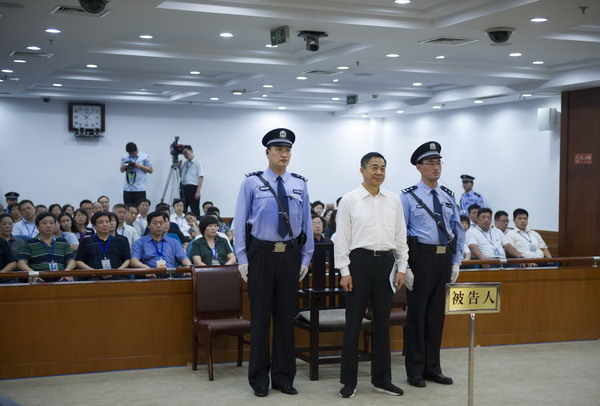

In a fresh move to check extravagance and promote thrift, the Party leadership passed a regulation aimed at stopping the squandering of public money by Party and government organs on Tuesday.
The new leadership have not relented in their nationwide efforts to combat extravagance, which they launched as soon as they came to power with the introduction of eight measures aimed at improving the work style of officials and curbing the waste of public money, Beijing News said in a Wednesday editorial.

Former Chongqing Party chief Bo Xilai (C) listens to his verdict inside the Jinan Intermediate People's Court in Jinan, Shandong province September 22, 2013. The court sentenced Bo to life in prison on Sunday after finding him guilty of all the charges he faced of corruption, taking bribes and abuse of power. [Photo / Xinhua]
A few days ago, the discipline commission of the Yunnan provincial Party committee exposed five cases involving the violation of the Party's eight-measure resolution on working style, and more than 100 similar malpractices have been made public.
The latest regulation - with binding force -means the CPC has escalated its months-long anti-extravagance battle. The Party's political bureau conference also urged accelerated efforts to come up with the supplementary systems to frame an all-directional institutional system for promoting thrift and fighting waste. What can be expected in the future will be more details and measures in a variety of fields, either at the central or local level.
By pushing for the institutionalization of its anti-extravagance campaign, the leaders are sending an unequivocal message to the outside that it looks upon this as a long-term battle rather than a transient campaign.
The anti-squandering drive has achieved some positive results over the past months throughout China, but the causes of some malpractices that lead to extravagance and the squandering of public money have not yet been uprooted. The recent exposure of the lavishly decorated government office buildings in a county in eastern Jiangsu province and a nationally designated poor county in central Henan province is a clear sign that the battle against extravagance is far from over.
Spending on meetings is another area where taxpayers' money is splashed about. Due to the lack of transparency, spending in this area has not fueled the same public outrage as the money squandered on official banquets, vehicles, and overseas visits. But the loophole allowing public money to be wasted on official meetings should be plugged through budgetary transparency.
China still faces an uphill task to institutionalize its anti-extravagance efforts. To press ahead, the country should not just reinforce its internal administrative restraints, such as tightened oversight, a more scientific budgetary system and harsher punishments, it should also strive to introduce an unblocked external oversight channel, such as the creation of a looser environment so the public and media can be overseers.
(China Daily 10/31/2013 page8)